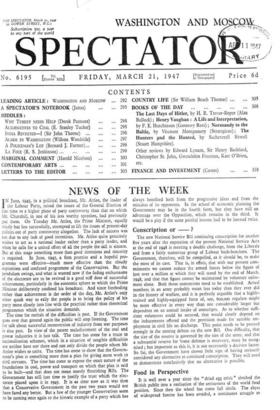NEWS OF THE WEEK
IN June, 1945, in a political broadcast, Mr. Attlee, the leader of the Labour Party, raised the issues of the General Election of that time to a higher plane of party controversy than that on which Mr. Churchill, in one of his less worthy speeches, had previously put them. On Tuesday Mr. Attlee, the Prime Minister, equally wisely but less successfully, attempted to lift the issues of present-day politics out of party controversy altogether. The lack of success was not due to any lack of good intentions. Mr. Attlee quite genuinely wishes to act as a national leader rather than a party leader, and when he calls for a united effort of all the people the call is sincere. But at this stage something more than good intentions and sincerity is required. In June, 1945, a firm promise and a hopeful pro- gramme were effective—much more effective than the cloudy aspirations and confused programme of the Conservatives. But the pendulum swings, and what is wanted now if the fading enthusiasms of the electorate are to be revived is a good stiff dose of successful achievement, particularly in the economic sphere to which the Prime Minister deliberately confined his broadcast. And since foreboding rather than achievement is the order of the day, Mr. Attlee's only other quick way to rally the people is to bring the policy of his party more closely into line with the practical rather than theoretical programmes which the situation demands.
The time for recitals of the difficulties is past. If the Government goes over that ground again the public will stop listening. The time for talk about successful reconversion of industry from war purposes is also past. In view of the patent maladjustment of the coal and power industries it is just talk. The time has come for a truce to nationalisation schemes, which in a situation of tangible difficulties are neither here nor there and can only divide the people whom Mr Attlee wishes to unite. The time has come to show that the Govern- ment's plan is something more than a plan for giving more work to civil servants. The time has come to expose the exact nature of the foundations in coal, power and transport on which that plan is said to be built—and that does not mean merely flourishing Bills. The Government has still just time to justify the trust which the elec- torate placed upon it in 1945. It is as clear now as it was then that a Conservative Government in the past two years would not have fared any better. But a few of the younger Conservatives seem to be turning once again to the historic example of a party which has
always benefited both from the progressive ideas and from the mistakes of its opponents. In the school of economic planning the Government may be in the fourth form, but they have still an advantage over the Opposition, which remains in the third. It would be a pity if the same painful lessons had to be learned twice.


































